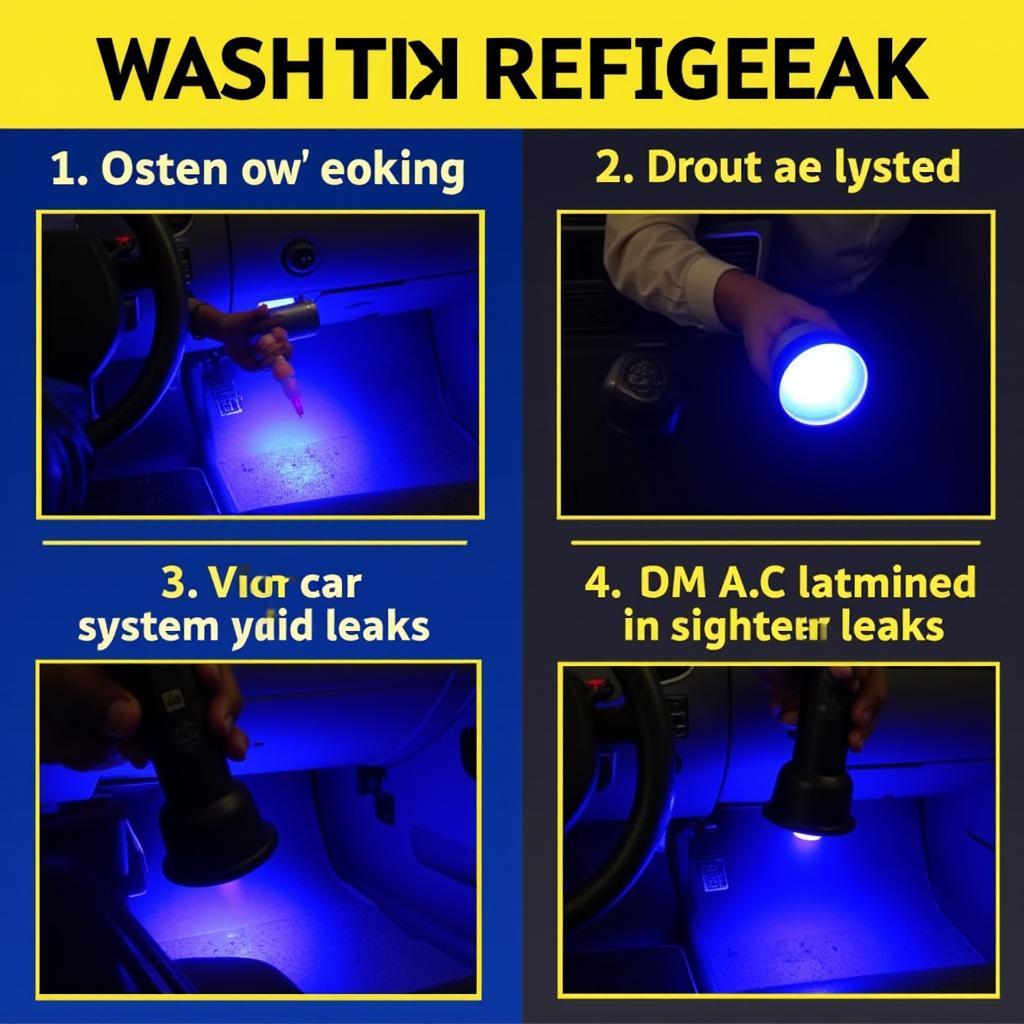Trying to beat the summer heat but facing a car AC on the fritz? Don’t sweat it! Before you shell out big bucks at a mechanic, there are several Car Ac Fix For Free methods you can try yourself. While some AC issues require professional expertise, many stem from simple, easy-to-fix problems. This comprehensive guide will walk you through common car AC issues and how to troubleshoot them, potentially saving you a trip to the shop and keeping your cool all summer long.
Understanding Your Car’s AC System
Before diving into DIY fixes, it’s helpful to understand the basics of how your car’s AC system works. Essentially, it’s a closed system that uses refrigerant to cool the air.
Here’s a simplified breakdown:
- Compressor: This component compresses the refrigerant gas, raising its temperature.
- Condenser: Located at the front of your vehicle, the condenser cools the hot refrigerant gas, converting it into a liquid.
- Receiver/Dryer: This component removes moisture from the refrigerant and stores excess refrigerant.
- Expansion Valve: This valve regulates the flow of refrigerant into the evaporator.
- Evaporator: As the refrigerant evaporates, it absorbs heat from the surrounding air, cooling it down.
- Blower Motor: The blower motor then blows this cool air into your car’s cabin.
Common Car AC Problems and Free Fixes
Many AC issues can be resolved without spending a dime. Here are some common problems and their potential free fixes:
1. AC Blowing Hot Air
This is a frequent complaint, often indicating a problem with refrigerant levels, airflow, or electrical components.
Free Fixes:
- Check your cabin air filter: How to fix air vents in car A clogged filter restricts airflow, leading to warm air blowing from the vents. Replacing or cleaning the filter might be the simple solution you need.
- Inspect the fuse: A blown fuse can disrupt power to the AC system. Check your owner’s manual for the location of the AC fuse and replace it if necessary.
- Look for loose connections: Inspect the wiring and connections to the AC compressor and other components. Tighten any loose connections.
2. Weak Airflow
Weak airflow can stem from issues with the blower motor, vents, or a clogged filter.
Free Fixes:
- Check vent controls: Ensure the vents are open and directed properly. It sounds simple, but it’s easy to overlook!
- Inspect the blower motor resistor: This resistor controls the blower motor speed. If it’s faulty, you might experience weak or intermittent airflow. Consult your owner’s manual for its location and inspect it for damage.
3. AC Making Noise
Unusual noises from your AC system can signal problems with the compressor, belts, or other components.
Free Fixes:
- Inspect the drive belt: A loose or worn drive belt can cause squealing noises. Tighten or replace the belt as needed.
- Listen for unusual sounds: Pay attention to any grinding, clicking, or hissing noises. These could indicate more serious issues requiring professional attention.
“Even seemingly minor noises from your AC system can indicate a larger problem. Addressing them early can prevent costly repairs down the line.” – Mark Stevenson, Automotive Engineer at AutoTipPro
4. AC Leaking Water
While some condensation is normal, excessive leaking inside your car can signal a blocked drain line.
Free Fixes:
- Locate and clear the AC drain: The drain is usually located under the car, near the firewall. Use a wire hanger or similar tool to clear any clogs.
5. AC System Freezing Up
If your AC blows cold air initially but then stops working, the system might be freezing up.
Free Fixes:
- Check for refrigerant leaks: How to fix car ac freezing up Low refrigerant can cause the system to freeze up. Look for signs of leaks around hoses and connections.
 Detecting Refrigerant Leaks in Car AC System
Detecting Refrigerant Leaks in Car AC System
When to Seek Professional Help
While DIY fixes can address many car AC issues, some problems require professional attention. If you experience any of the following, it’s best to consult a qualified mechanic:
- Persistent problems despite trying free fixes
- Complex electrical issues
- Suspected refrigerant leaks
- Compressor failure
“Attempting complex car AC repairs without proper knowledge and equipment can lead to further damage and safety hazards.” – Maria Rodriguez, Lead Technician at AutoTipPro
Conclusion
A malfunctioning car AC can make summer driving unbearable. Before heading to the mechanic, try these car AC fix for free methods to potentially resolve the issue yourself. However, if the problem persists or appears complex, don’t hesitate to seek professional help.
For further assistance with your car’s AC or any other automotive needs, feel free to contact us at AutoTipPro.
Contact AutoTipPro:
Phone: +1 (641) 206-8880
Office: 500 N St Mary’s St, San Antonio, TX 78205, United States
FAQs
1. How often should I recharge my car’s AC?
While systems are designed to be sealed, minor leaks can occur over time. It’s generally recommended to have your AC system checked and recharged, if necessary, every 2-3 years.
2. Can I use any air filter for my car’s AC?
No, it’s crucial to use the correct filter type and size specified in your owner’s manual for optimal performance.
3. Why is my car AC blowing cold air on one side but hot air on the other?
This could indicate a problem with the blend door or a low refrigerant charge.
4. How can I prevent future car AC problems?
Regular maintenance, such as checking the refrigerant levels, inspecting belts and hoses, and replacing the cabin air filter, can help prevent many AC issues.
5. Can a dirty cabin air filter affect my car’s fuel efficiency?
Yes, a clogged filter restricts airflow, forcing the blower motor to work harder and potentially reducing fuel efficiency.




Leave a Reply